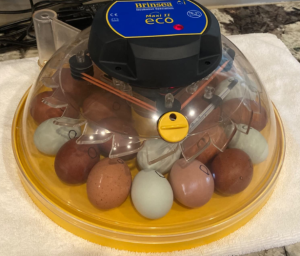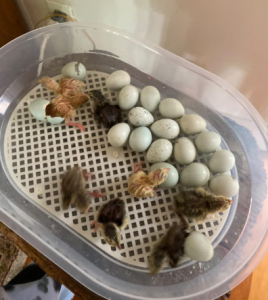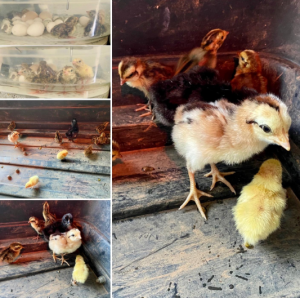Best Robin Egg Incubators
Robin eggs require specific conditions for successful hatching, including precise temperature and humidity control. Choosing the right incubator can make all the difference. Here’s a detailed guide to the best incubators for robin eggs, highlighting their features, pros, and cons.
1. Brinsea Mini II Advance Automatic Incubator
Overview: The Brinsea Mini II Advance is perfect for hatching smaller eggs like those of robins. It offers excellent control and reliability, making it a top choice for bird enthusiasts.

Key Features:
- Automatic Turning: Ensures even heating and prevents the embryos from sticking to the shell.
- Digital Display: Shows temperature, humidity, and turning status.
- High Precision: Advanced temperature control for consistent results.
- Capacity: Holds up to 7 small eggs, such as robin eggs.
Pros:
- User-friendly interface
- Durable construction
- Accurate temperature and humidity control
Cons:
- Limited capacity
- Higher price point
2. Magicfly Digital Mini Fully Automatic Egg Incubator
Overview: The Magicfly Digital Mini is a budget-friendly option that offers automatic turning and digital controls, making it suitable for hatching small batches of robin eggs.

Key Features:
- Automatic Turning: Rotates eggs automatically.
- Digital Display: Shows temperature and humidity.
- Compact Size: Holds up to 10-12 small eggs.
- Temperature Control: Precise control for optimal hatching conditions.
Pros:
- Affordable
- Compact and portable
- User-friendly digital controls
Cons:
- Smaller capacity
- May not be as durable as higher-end models
3. Hova-Bator Advanced Egg Incubator
Overview: The Hova-Bator Advanced offers reliable performance and can handle a variety of egg sizes, making it versatile for hatching robin eggs.

Key Features:
- Thermal Air Flow System: Ensures even temperature distribution.
- Digital Thermometer and Hygrometer: Accurate readings for optimal conditions.
- Automatic Turner Compatible: Can be used with an automatic egg turner.
- Capacity: Holds up to 20 small eggs.
Pros:
- Affordable
- Versatile for different egg sizes
- Reliable performance
Cons:
- Manual turning required (unless used with an automatic egg turner)
- Build quality could be better
4. Nurture Right 360 Incubator
Overview: The Nurture Right 360 is known for its excellent visibility and ease of use. It’s a great option for those who want to closely monitor the hatching process.
Key Features:
- 360-Degree Visibility: Clear plastic dome for full observation.
- Automatic Egg Turner: Ensures eggs are turned gently and consistently.
- Built-In LED Candler: Allows for easy monitoring of egg development.
- Capacity: Holds up to 22 small eggs.
Pros:
- Excellent visibility
- Easy to use
- Built-in candler for monitoring
Cons:
- Smaller capacity for larger projects
- Slightly more expensive than basic models
5. Farm Innovators Model 4250 Digital Circulated Air Incubator
Overview: The Farm Innovators Model 4250 offers a bit more capacity while still being affordable. It includes several features typically found in more expensive models.
Key Features:
- Automatic Egg Turner: Turns eggs every 4 hours.
- Digital Display: Shows temperature, humidity, and days to hatch.
- Circulated Air Fan: Ensures even temperature distribution.
- Capacity: Holds up to 41 small eggs.
Pros:
- Larger capacity
- Automatic turning
- Circulated air fan for consistent temperature
Cons:
- Slightly higher price than basic models
- May require additional calibration for accuracy
Comparison Table
| Incubator | Capacity (Robin Eggs) | Automatic Turning | Digital Display | Price Range |
|---|---|---|---|---|
| Brinsea Mini II Advance | 7 | Yes | Yes | $$$ |
| Magicfly Digital Mini | 12 | Yes | Yes | $ |
| Hova-Bator Advanced | 20 | Optional | Yes | $$ |
| Nurture Right 360 | 22 | Yes | Yes | $$ |
| Farm Innovators Model 4250 | 41 | Yes | Yes | $$ |
Choosing the Right Incubator for Robin Eggs
Capacity
- Small-Scale: For small batches, the Brinsea Mini II Advance and Magicfly Digital Mini are ideal.
- Medium-Scale: The Nurture Right 360 and Hova-Bator Advanced offer a balance of capacity and features.
- Large-Scale: The Farm Innovators Model 4250 is suitable for larger hatching projects.
Budget
- Most Affordable: The Magicfly Digital Mini provides great value for tight budgets.
- Mid-Range: The Hova-Bator Advanced and Nurture Right 360 offer good features without breaking the bank.
- High-End: The Brinsea Mini II Advance provides advanced features and reliability for serious hobbyists.
Features
- Automatic Turning: Reduces manual labor and increases hatch rates. Look for incubators with this feature for convenience.
- Digital Controls: Simplify the monitoring and adjustment of temperature and humidity.
- Visibility: Clear domes or built-in candlers help you monitor the hatching process easily.
Tips for Successful Robin Egg Incubation
- Temperature: Maintain a consistent temperature of around 99°F (37.2°C) for robin eggs.
- Humidity: Keep humidity around 55% during the initial stages, increasing to 65-70% during the last three days.
- Turning: Ensure eggs are turned regularly if your incubator does not have an automatic turner.
- Ventilation: Ensure proper airflow within the incubator.
- Candling: Periodically check the development of embryos using a candler.
Conclusion
Selecting the best incubator for robin eggs depends on your specific needs, whether you’re a beginner or an experienced hobbyist. The Brinsea Mini II Advance and Magicfly Digital Mini are excellent for small-scale hatching, while the Nurture Right 360 and Hova-Bator Advanced offer great mid-range options. For larger projects, the Farm Innovators Model 4250 is unparalleled. Assess your capacity requirements, budget, and desired features to make the best choice for successful robin egg hatching.

